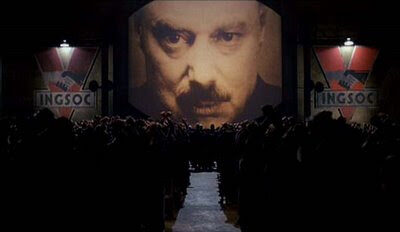Many people have a hard time with the very concept of a God who knows our thoughts. The issue that True Freethinker wished to address is not the question of how God could know our thoughts, the thoughts of every living person.
I wish to address what I will refer to as the psychological troubling portion of the concept. That is to say that some find it troubling that God could know our thoughts so that even our motivations are known and also the repulsion that some feel towards being held accountable for their thought life.

This last portion is elucidated particularly well in the semantic stylings of Christopher Hitchens:
Well it’s here that we find something very sinister about Monotheism and about religious practice in general. It is incipiently at least and I think often explicitly totalitarian, because I have no say in this. I am born under a celestial dictatorship which I could not have had any hand in choosing. I don’t put myself under its Government. I am told that it can watch me while I sleep. I’m told that it can convict me of, here’s the definition of totalitarianism, thought crime, for what I think I may be convicted and condemned.1
While I find it sad, disappointing and perhaps unfair, Christopher Hitchens does spend quite a bit of time during his debates lobbing emotionally charged statements such as those we encountered here, “very sinister…incipiently…explicitly totalitarian…dictatorship…totalitarianism, thought crime…convicted and condemned.” Imagine an entire debate peppered with such statements and you have the reality of Christopher Hitchens as a debater (and writer). However, I do wish to empathize and do so particularly because he is an atheist and one of the reasons that atheism is a consoling delusion is that it provides the delusion of absolute autonomy and ultimate lack of accountability.Our thoughts are not something to be neglected. They are not to be neglected by us and it would certainly be neglectful for God to disregard them. Our thoughts are very important and very powerful. The major categories that I wish to deal with are: fantasy and motivation or rather, fantasy as a springboard for our motivations which then lead to actions.
It is tempting to think of our fantasies as our very own realm in which we can do as we wish without any impedance. We are, after all, not actually doing anything are we? We are not hurting anyone even with our most malicious thoughts, right?
It is precisely because our thoughts are a realm of, let us say, absolute freedom that we are to be so very careful about them. Keep in mind that absolute freedom corrupts absolutely. We may say that we are the gods of the world of our thoughts. Yet, in our capacity as gods of our thoughts we are not necessarily benevolent deities.

A glimpse of our fantasies, sexual fantasies for instance, serves as a good example of the power of our thoughts and the omnipotence that we enjoy in our thoughts.Consider a man who imagines an encounter with a woman (a friend, a co-worker, a perfect stranger, etc.) does he have to put vast amounts of time and energy into gathering the courage to approach her and ask her for a date? No.Does he have to keep his personality in check, being self-less and treating her nicely? No.Does he have to assure her of his fidelity by being committed to her for, perhaps, a few years before they get married? No.Does he have to be there for her, with her, for better, for worse, for richer, for poorer, in sickness and in health, until death do them part? No.In his fantasy he can simply have her-he forces her to love him and forces her to enjoy it.Some such fantasies, drawn out to whatever extent and to whatever level of sexuality, can fizzle away into nothingness only to be forgotten. Or they can lead the man to take the appropriate actions and end up with her, the actual human being, in a happy and healthy relationship. It could also lead to her rejecting him. Yet, such fantasies can also lead to rape.It is certainly advantageously inflammatory to refer to “totalitarianism, thought crime” but there is logic behind admonitions about our thought life. First is the concept of becoming that which we oft muse about. For instance, a real go getter may become very successful as she progresses from thought, to motivation, to action. A person overly concerned about evil powers may be constantly saying that, “It’s the devil” whenever anything goes wrong. An atheist may be so overcome with prejudice against religion and God that every prayer uttered out loud, in public, every public sign of “faith” is taken as a personal affront. Some people’s over occupation with sexual fantasies has led to STDs which is some cases even lead to death.
Let us furthermore consider that there are very logical reasons why most judicial systems distinguish, for example, between different forms of murder by degree such as premeditation (contemplation, reflection). You are more culpable if you planned out a murder since you thought about it, fantasized about it, were motivated by it, and finally performed the act. This act could have been stopped before it ever was committed if the thought process would have been halted or redirected.

Some people appear to think that in their thoughts they can indulge every malicious and perverted fantasy and still consider themselves to be “a good person” because they did not actually do any of it. Yet, even assuming that their twisted fantasies never lead to actions, is this healthy? Is it healthy to have someone smile to your face whist thinking “Drop dead!” Is it healthy to have someone meet your spouse in a congenial manner only to consider them something to be toyed with in their fantasies? Our thoughts and fantasies are, after all, a part of our psyche, a part of our makeup, and a part of us that demands more and more even while seeking to escape into the realm of action.Now consider, if I pulled out a gun and shot a bullet at your head but just happened to miss would you, or the authorities, say, “Oh, hey, cut that out. Well, ok then, I’m gonna go get lunch. Bye”? Why not? After all, I did not actually cause any harm. Yes, but I might have and I certainly intended to do so. I intended to in my thoughts and in my actions, but nothing came of it. The difference between this scenario and my merely thinking about shooting you is not as different as it may seem. Is not the point that either in my thoughts or in my shooting and missing I did not actually harm you? It is certainly more closely related than my merely thinking about it and actually doing it. Certainly, exhibiting malice is different than merely considering malice but the point, again, is the importance of your thought life.Moreover, consider a city fire that is burning up hundreds of homes and has taken many lives. Would you rather fight that massive and deadly fire? Or, would you have rather put out the little match that started it in the first place? Of course, you would, with a little puff of wind or wetting your fingertips, put that little match out and prevent the fire in the first place. Or you could simply not light the match in the first place.Would you rather I reconsider attempting to introduce your gray matter to a projectile before or after I actually make an attempt?
Likewise, our thoughts can be little matches that if left unchecked or if they have fuel added to them can become massive and deadly. My point is not to encourage governmental thought police. Even though we do have it to some extent and for good reason such as ascertaining premeditation. I would, perhaps, go as far as recommending that thought police be our own jurisdiction of self-policing. Our thoughts can give rise to benevolence or malevolence and are oft the starting place of them both. Therefore, our thoughts are not to be neglected – not by humanity nor by God.
